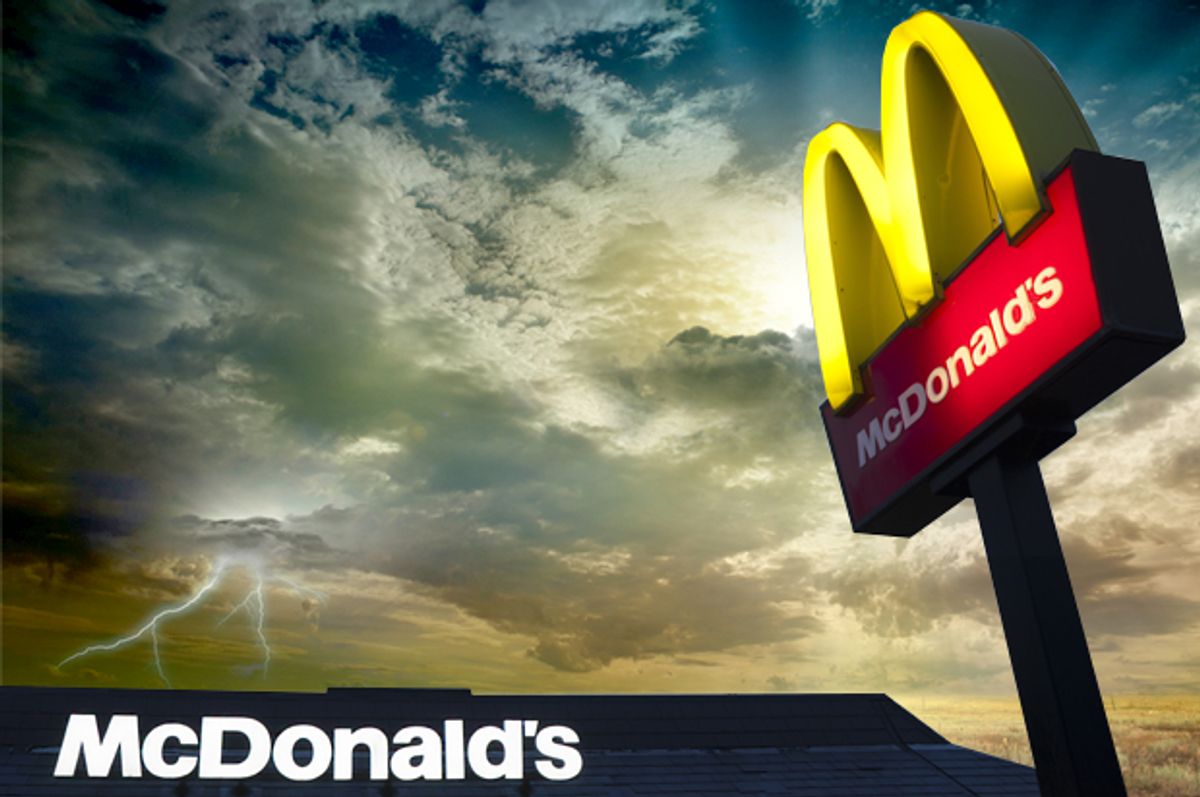On Thursday, a group of former employees of a Virginia McDonald's sued the franchise for racial and sexual discrimination, alleging that they were fired because there were "too many black people." The suit was brought to federal court by 10 recently fired employees (nine are black and one is Hispanic) who claim that Michael Simon, the operator of three franchise locations in the state, said the restaurants were "too dark" and they needed to hire more people to "get the ghetto out of the store." The lawsuit also claims that managers would frequently refer to them with racist terms including "ghetto," "ratchet" and "dirty Mexican," while female employees claim that they were inappropriately touched and sent sexually graphic photographs.
A statement from McDonald's corporation reads: "McDonald's has a long-standing history of embracing the diversity of employees, independent Franchisees, customers and suppliers, and discrimination is completely inconsistent with our values."
The lawsuit comes just a month after the National Labor Relations Board made history by holding the national McDonald's Corporation responsible for violations occurring at its individual franchises -- a move that the corporation is expectedly fighting. The brand has been subject of a number of labor-related qualms, including coordinated strikes for $15-per-hour wages.
But these lawsuits are only one episode in a series of scandals that have marked McDonald's illustrious legacy as one of America's most resilient villains. Here is a list of the fast food giant's most memorable scandals:
Dangerously Hot Coffee
In 1992, a woman spilled hot coffee in her lap at an Albuquerque McDonald's, resulting in third-degree burns that necessitated skin graft surgery. She later sued the corporation, alleging that McDonald's instructed its franchises to serve coffee at a dangerously hot temperature. The woman initially won $2.9 million, which was later reduced to $640,000 and finally settled out of court, but not before the case became national news.
The Myth of the Vegetarian French Fries
The corporation was forced to pay a $10 million settlement to vegetarian and religious groups for misleading the public regarding the content of its French fries. After the chain announced its decision to start cooking its fries in vegetable oil, much of the public assumed that this meant the food was now vegetarian-friendly. McDonald's had failed to disclose that beef tallow was actually still used for flavoring. The corporation later issued an apology.
McLibel Case
Otherwise known as McDonald's Corporation v. Steel & Morris, this 1997 case eventually became the longest-running civil case in English history. McDonald's Corporation sued environmental activists Helen Steel and David Morris for libel for distributing a London Greenpeace pamphlet called "What's wrong with McDonald's -- Everything they don't want you to know." The pamphlet accused the corporation of a number of wrongdoings, including animal mistreatment, destroying the rainforest and encouraging littering. An investigation revealed that some of the pamphlet's claims were false, but many were true. McDonald's was widely ridiculed for waging such aggressive legal warfare for only a partial victory, especially against two individual activists with few resources. The saga was later made into a movie.
Generally Questionable Ingredients
McDonald's doesn't have the most sterling reputation when it comes to the freshness and quality of products, so it's no surprise that questions have arisen over the years regarding the provenance of the company's meat products. First, McDonald's had to reckon with panic surrounding the use of "pink slime" -- the lean, finely ground beef and beef byproduct mixture shown oozing out of factory dispensers -- in its burgers. While the chain admitted to using the so-called slime, it claims to have stopped in 2011 and now uses 100 percent "pure beef." The chain also recently released a video featuring "MythBusters" host Grant Imahara assuring the viewer that McNuggets are made of actual chicken. As Salon's Lindsay Abrams points out: "That's a pretty egregious half-truth... one that skips over McNuggets' high fat and sodium content and conflates the hype over 'pink slime' and consumer unease with the hidden ingredients in processed food with the real, systemic problem of how industrial meat production operates."
A Pattern of Labor Law Violations
McDonald's has a long, spotty history of labor relations. For a while, employees silently suffered. But since November 2012, workers have been walking off the job in protest. In Brazil, McDonald's has been accused of mistreatment of pregnant employees, poverty-level pay and wage theft, according to The Guardian. In the U.S., McDonald's has been accused of making guest workers take 25-hour shifts without overtime pay. While no overarching action has been taken, the lawsuit mentioned above could make the national corporation responsible for addressing the pattern of abusive workplaces.
Needless to say, we are nawt lovin' it.

Shares